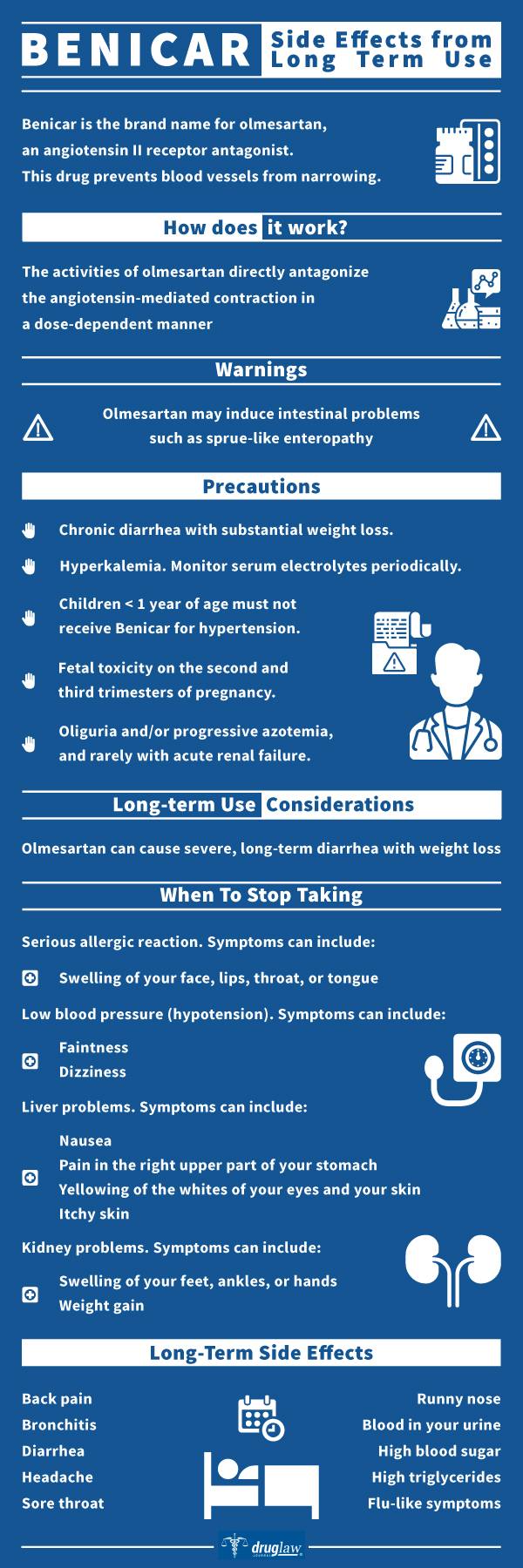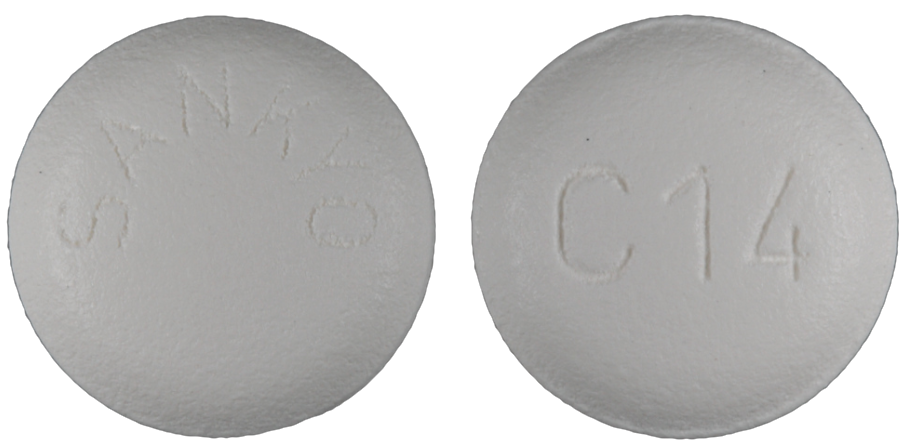Benicar, the brand name for Olmesartan, is an angiotensin II receptor antagonist. This drug prevents blood vessels from narrowing, and is prescribed to treat hypertension in adults and children who are at least six years old. Benicar is sometimes given together with other blood pressure medications.
Prescription Name and Overview
Benicar is the prescription name of Olmesartan. It is prescribed to treat hypertension. The dosage of Benicar must be individualized, and comes in three variants:
- 5 mg yellow, round, film-coated, non-scored tablets debossed with Sankyo on one side and C12 on the other side
- 20 mg white, round, film-coated, non-scored tablets debossed with Sankyo on one side and C14 on the other side
- 40 mg white, oval-shaped, film-coated, non-scored tablets debossed with Sankyo on one side and C15 on the other side
The usual recommended starting dose of Benicar is 20 mg once daily when used as monotherapy in patients who are not volume-contracted. For patients requiring further reduction in blood pressure after two weeks of therapy, the dose of Benicar may be increased to 40 mg.
Generic Name and Overview
Olmesartan Medoxomil is a nonpeptide antihypertensive with no chiral centers. Orally available, olmesartan is usually presented in the form of olmesartan medoxomil which is a prodrug rapidly converted in vivo to the pharmacologically active olmesartan. It was developed by Daiichi Sankyo Pharmaceuticals and approved in 2002.
The following are also brand names of Olmesartan: Erastapex (Apex Pharma), Golme (Golgi USA Research Laboratories Ltd), Olmetec (Merck), Olmy (Zydus Cadila), Olsar (Unichem Laboratories), Olvance (Ranbaxy Laboratories Ltd), and WinBP (Abbott Healthcare Pvt Ltd).
OTC Name and Overview
Olmesartan is the OTC name of Benicar.
Manufacturer
Benicar is manufactured by Daiichi Sankyo, Inc.
Labeled Indications
Benicar is indicated for the treatment of hypertension, to lower blood pressure. Lowering blood pressure reduces the risk of fatal and nonfatal cardiovascular events, primarily strokes and myocardial infarctions. These benefits have been seen in controlled trials of antihypertensive drugs from a wide variety of pharmacologic classes including the class to which this drug principally belongs.
For adult hypertension, the United States FDA prescribes 20 – 40 mg once daily. For pediatric hypertension (six to sixteen years), the United States FDA prescribes < 10 to 20 mg once daily.
Hypertension is a sustained elevation of resting blood pressure. The hypertensive effect can affect the systolic blood pressure, diastolic blood pressure or both. This condition tends to be asymptomatic until it reaches a severe or long-standing state.
Active Ingredients
The active ingredient in Benicar is Olmesartan Medoxomil. Olmesartan Medoxomil is a prodrug rapidly converted in vivo to the pharmacologically active Olmesartan.
What Is It Used For?
Benicar is primarily used for the treatment of hypertension.
How Does it Work?
The activities of Olmesartan directly antagonize the angiotensin-mediated contraction in a dose-dependent manner. The activity of Olmesartan can produce inhibition of 90% of the muscle contractility for at least 90 minutes. The activity of Olmesartan is mainly performed in vascular smooth muscle cells and hence its activity prevents the vasoconstrictor effects of angiotensin II.
What are the Approved Uses?
Benicar is indicated for the treatment of hypertension, to lower blood pressure. Lowering blood pressure reduces the risk of fatal and nonfatal cardiovascular events, primarily strokes and myocardial infarctions.
Production Anecdotes / History
During the 1950s, ’60s and ’70s, Sankyo manufactured the first antibiotic produced in Japan, a vitamin B compound and an anti-cancer drug (Krestin). Daiichi launched Iscotin, a medicine for tuberculosis, an antiplasmin medication and a treatment for ulcers.
As the turn of the century approached, the two companies – Daiichi and Sanyo – worked on blood-pressure medicines, antibiotics and diabetes drugs. Sankyo launched the popular antacid Zantac in 1984 and the first statin drug in 1989 (Mevalotin). It also established business units around the globe. Sankyo launched Benicar in the United States in 2002 and in Japan two years later. In 2016, the company lost exclusive rights to the drug in the United States and generic versions began to come on the market.
Precautions
There are a number of precautions against Benicar, namely:
- Fetal toxicity: Use of drugs that act on the renin-angiotensin system during the second and third trimesters of pregnancy reduces fetal renal function and increases fetal and neonatal morbidity and death.
- Children < 1 year of age must not receive Benicar for hypertension.
- In patients with an activated renin-angiotensin aldosterone system, such as volume- and/or salt-depleted patients (e.g., those being treated with high doses of diuretics), symptomatic hypotension may be anticipated after initiation of treatment with Benicar. Initiate treatment under close medical supervision.
- In patients whose renal function may depend upon the activity of the renin angiotensin-aldosterone system (e.g., patients with severe congestive heart failure), treatment with angiotensin converting enzyme (ACE) inhibitors and angiotensin receptor antagonists has been associated with oliguria and/or progressive azotemia, and rarely with acute renal failure and/or death.
- In studies of ACE inhibitors in patients with unilateral or bilateral renal artery stenosis, increases in serum creatinine or blood urea nitrogen (BUN) have been reported.
- Severe, chronic diarrhea with substantial weight loss has been reported in patients taking olmesartan months to years after drug initiation.
- Benicar contains olmesartan, a drug that inhibits the renin-angiotensin system (RAS). Drugs that inhibit the RAS can cause hyperkalemia. Monitor serum electrolytes periodically.
Long-Term Use Considerations
Olmesartan can cause severe, long-term diarrhea with weight loss. If you have diarrhea and weight loss and your doctor can’t find another cause for it, you may need to stop taking this drug.
Drug Interactions
Can Interact with the Following
- Bipolar disorder drug interactions: taking olmesartan with your bipolar medication may increase the levels of the bipolar disorder drug in your body. This may cause dangerous effects. This drug may include lithium.
- Taking certain blood pressure medications with olmesartan can increase your risk of high blood potassium levels, kidney damage, and low blood pressure (hypotension). Examples of these drugs include: aliskiren, angiotensin receptor blockers (ARBs), such as: osartan, valsartan, and telmisartan; angiotensin-converting enzyme (ACE) inhibitors, such as: captopril, enalapril, lisinopril
- Taking Nonsteroidal anti-inflammatory drugs with olmesartan can increase your risk of kidney damage. Your risk may be higher if you’re a senior, take a diuretic, are dehydrated, or already have poor kidney function. Also, NSAIDs may decrease the effect of olmesartan. This means that it may not work as well to lower your blood pressure. NSAIDs include ibuprofen and naproxen.
- Taking Colesevelam with olmesartan can reduce the amount of olmesartan that your body absorbs. If you take both of these drugs, you should take olmesartan at least 4 hours before you take colesevelam.
Can’t Interact with the Following
- No significant drug interactions were reported in studies in which Benicar was co-administered with digoxin or warfarin in healthy volunteers.
- The bioavailability of olmesartan was not significantly altered by the co-administration of antacids.
- Olmesartan medoxomil is not metabolized by the cytochrome P450 system and has no effects on P450 enzymes; thus, interactions with drugs that inhibit, induce, or are metabolized by those enzymes are not expected.
When To Stop Taking Benicar
It is recommended to stop taking Benicar when you exhibit the following symptoms:
- Serious allergic reaction. Symptoms can include:
- Swelling of your face, lips, throat, or tongue
- Low blood pressure (hypotension). Symptoms can include:
- Faintness
- Dizziness
- Liver problems. Symptoms can include:
- Nausea
- Pain in the right upper part of your stomach
- Yellowing of the whites of your eyes and your skin
- Itchy skin
- Kidney problems. Symptoms can include:
- Swelling of your feet, ankles, or hands
- Weight gain
Long-Term Side Effects
Long-term side effects of taking Benicar (olmesartan) are:
- Back pain
- Bronchitis
- Diarrhea
- Headache
- Blood in your urine
- High blood sugar
- High triglycerides
- Flu-like symptoms, such as fever and body aches
- Sore throat, runny nose, and sinus infection
FDA Warnings (History Of)
Benicar was approved by the United States FDA in 2002. And in 2014, the US FDA issued a warning that Olmesartan may induce intestinal problems, such as sprue-like enteropathy. In March 2012, the Food and Drug Administration issued a fetotoxicity warning involving mothers taking Benicar (Olmesartan) to treat hypertension and lower blood pressure.
Importantly, the United States FDA has also warned that Olmesartan can harm or end your pregnancy. If you become pregnant, stop taking Olmesartan right away and call your doctor. If you plan to get pregnant, talk to your doctor about other ways to lower your blood pressure.
Other Common Side Effects
- Bladder pain
- Bloating or swelling of the face, arms, hands, lower legs, or feet
- Chest pain
- Cloudy urine
- Difficult, burning, or painful urination
- Fast, pounding, or irregular heartbeat or pulse
- Frequent urge to urinate
- Joint pain, stiffness, or swelling
- Lower back, side, or stomach pain
- Swelling of the feet or lower legs

Lawsuits
Currently, there are more than 1100 lawsuits pending against Daiichi Sankyo and Forest Laboratories. A federal Multi-District Litigation is set up for such cases. According to the New Jersey Law Journal, the first trial has been set up for late 2016. This is not the first time Daiichi Sankyo will be tried in court. In January 2015, the manufacturer settled a lawsuit for illegally marketing its drugs (including Benicar) by paying $39 million.
Sources Cited (5)
https://www.accessdata.fda.gov/drugsatfda_docs/nda/2002/21-286_Benicar.cfm
https://www.healthline.com/health/olmesartan-oral-tablet#important-warnings
https://s3-us-west-2.amazonaws.com/drugbank/fda_labels/DB00275.pdf?1551481706
https://www.rxlist.com/benicar-drug/patient-images-side-effects.htm#missdose

